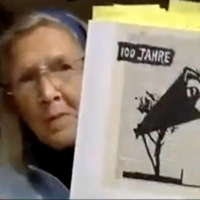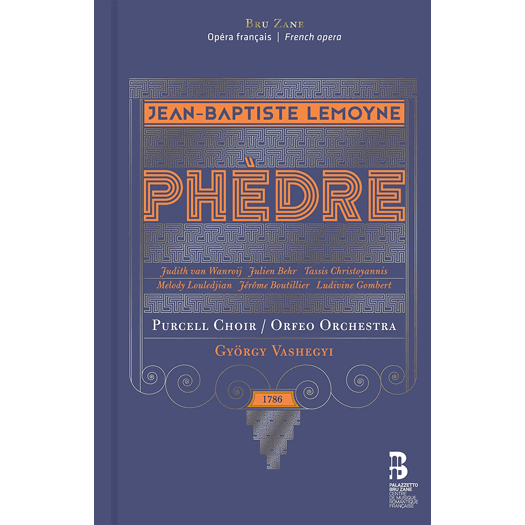- music for percussion
- Ervín Šulhov
- Mario Sereni
- Gerhard Schedl
- Dona Nobis Pacem
- John Rabe
- Salvatore Accardo
- Salieri: Piano Sonata in C
 VIDEO PODCAST: Discussion about Bernard Haitink (1929-2021), Salzburg, Roger Doyle's Finnegans Wake Project, the English Symphony Orchestra, the Chopin Competition Warsaw, Los Angeles Opera and other subjects.
VIDEO PODCAST: Discussion about Bernard Haitink (1929-2021), Salzburg, Roger Doyle's Finnegans Wake Project, the English Symphony Orchestra, the Chopin Competition Warsaw, Los Angeles Opera and other subjects.
 WORD SEARCH: Can you solve Allan Rae's classical music word search puzzles? We're currently publishing one per month.
WORD SEARCH: Can you solve Allan Rae's classical music word search puzzles? We're currently publishing one per month.

Ready for a Revival
GIUSEPPE PENNISI listens to 'Phèdre' - a rare opera by Jean-Baptiste Lemoyne
'The distinct feature of Lemoyne's opera is the weight and importance given to the protagonist. The role is sung by the Dutch soprano Judith van Wanroij: it fits her perfectly as can be felt in her initial major arias, with chorus as well as with other members of the cast.'
Do you remember Cherubini's Medée? It was a totally forgotten opera until revived in 1953 at the Maggio Musicale Fiorentino Festival in Florence. Maria Callas was the protagonist. Vittorio Gui was in the pit, the stage director was Luchino Visconti. It was an immense success. A few months later, the production was at La Scala with Leonard Bernstein in the pit.
Something similar may happen to Jean-Baptiste Lemoyne's Phèdre. The composer is hardly known. He had a comparatively short life from 1751 to 1792. From the rural Dordogne, where he was born, he joined a travelling opera company and reached Berlin. He had some success in Prussia and in Poland. When he returned to France, two of his operas (Electre and Phèdre) had excellent reviews and the audience's favour; thus, they had several performances. However, he got entangled in the infighting between Christoph Willibald Gluck, on the one hand, and Niccolò Piccinni and Antonio Sacchini, on the other, for the primacy in Paris musical scene. This undermined his career; his later operas had a somewhat limited success. Until now, Lemoyne was almost forgotten.
The Palazzetto Bru-Zane Centre de Musique Romantique Française just produced a book with essays (in French and in English) and two CDs tucked in the hard cover: they contain the first full recording of Phèdre. This could be the stepping-stone for a revival in opera houses, also because nowadays there are ‘absolute' sopranos with the texture and the vocal qualities of the protagonist. Lemoyne wrote his major operas for Antoinette Saint-Huberty, at the time a very rare kind of soprano. She had a strength, a volume, a texture and a dramatic intensity of expression that, years later, Richard Wagner found in Wilhelmine Schröder-Devrient. Nowadays, the role would fit perfectly someone like Sonya Yoncheva. As a result, I await an opera house director bold enough to take a challenge and stage Phèdre. Music critics and audience would reward him/her.
This magazine has reported on the research work, the festivals and the productions of the Palazzetto Bru Zane several times in the last ten years. Some of its precious CDs have been reviewed here quite often. They focus on rare works or rare editions quite often. Phèdre is especially important because its author is a rare bird too.
The plot follows quite closely Euripides' tragedy that was set to music even by contemporary composers such as Sylvano Bussotti. The syntax and style of Lemoyne's opera follows quite strictly the rules of the tragédie lyrique as formalized by Christoph Willibald Gluck, including ballet music.
The distinct feature of Lemoyne's opera is the weight and importance given to the protagonist. The role is sung by the Dutch soprano Judith van Wanroij: it fits her perfectly as can be felt in her initial major arias, with chorus as well as with other members of the cast.
Listen — Jean-Baptiste Lemoyne: Ô toi, dont la présence allume (Phèdre Act I)
(CD1 track 12, 0:41-1:33)
© 2020 Palazzetto Bru Zane / Centre de musique romantique française:
The strength of her voice and her dramatic intensity spring up in the first act finale when almost the whole company is on stage.
Listen — Jean-Baptiste Lemoyne: Au nom de votre fils reprenez la puissance
(Phèdre Act I)
(CD1 track 20, 1:35-2:28)
© 2020 Palazzetto Bru Zane / Centre de musique romantique française:
In the second act, the scene when Phèdre attempts to seduce her stepson, Hippolyte, is very sensual, not only dramatic.
Listen — Jean-Baptiste Lemoyne: Sur le trône allez vous asseoir (Phèdre Act II)
(CD2 track 4, 0:00-0:34)
© 2020 Palazzetto Bru Zane / Centre de musique romantique française:
So is their duet.
In the third act, the climax is reached in the storm scene and the death of Hippolyte first, and Phèdre, later.
Listen — Jean-Baptiste Lemoyne: Affreuse destinée (Phèdre Act III)
(CD2 track 22, 0:00-0:58) © 2020 Palazzetto Bru Zane / Centre de musique romantique française:
The CD was recorded in Budapest in the Béla Bartók Concert Hall in September 2019. György Vashegyi conducts the Orfeo Orchestra and the Purcell Chorus skilfully and with the proper touch for a tragédie lyrique.
Hippolyte is Julien Behr, a good French agility tenor.
Listen — Jean-Baptiste Lemoyne: Ô Diane, chaste déesse (Phèdre Act I)
(CD1 track 3, 0:00-0:43)
© 2020 Palazzetto Bru Zane / Centre de musique romantique française:
Thésée is Tassis Christoyannis a solid Greek baritone who has often collaborated with Palazzetto Bru Zane in recitals of French melodies. Oenone is Melody Louledjian. It is worth listening to their Act III recitative Ô jour affreux! ô destin déplorable.
Listen — Jean-Baptiste Lemoyne: Ô jour affreux! ô destin déplorable (Phèdre Act III)
(CD2 track 13, 3:11-4:10)
© 2020 Palazzetto Bru Zane / Centre de musique romantique française:
In short, this is a real discovery.
Copyright © 11 October 2020
Giuseppe Pennisi,
Rome, Italy

CD INFORMATION - JEAN-BAPTISTE LEMOYNE: PHÈDRE
FURTHER INFORMATION: PALAZZETTO BRU ZANE
FURTHER ARTICLES ABOUT FRANCE AND FRENCH MUSIC


